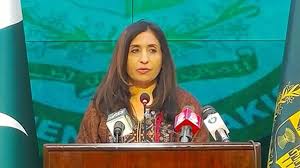Pakistan ‘deeply disappointed’ by UNSC dissensus on Palestine’s full UN membership; regrets US veto: FO

Celina Ali
Islamabad: Pakistan on Friday expressed its disappointment on the United Nations Security Council’s inability to reach a consensus on Palestine’s full membership of the United Nations, also regretting the US decision to veto the draft resolution.
“Pakistan is deeply disappointed by the result of last night’s debate at UNSC and its inability to reach a consensus and recommend Palestine’s membership to UNGA. We regret the US decision to veto the draft resolution granting full membership of the UN to Palestine,” Foreign Office spokesperson Mumtaz Zahra Baloch said in her weekly press briefing.

The Security Council blocked Palestine’s bid to become a full member of the United Nations due to a United States veto on a widely-supported resolution that would have recommended the granting of such status. The proposal, submitted in the 15-member Council by Algeria, received 12 votes in favour, with the United States casting a negative vote and Switzerland and the United Kingdom abstaining. A Council resolution requires at least nine votes in favour and no vetoes from its five permanent members — China, France, the Russia, the United Kingdom and the United States — to pass. “We believe, the time has come for admission of Palestine to the UN.

This will be a step towards correcting the historic injustice suffered by Palestinians for over 75 years. It will affirm their right to self-determination,” she remarked. The spokesperson said that the people of Palestine had their inherent right to live in a sovereign Palestinian state with the pre-1967 borders and Quds Al-Sharif as its capital. To a question, she said the upcoming OIC summit in Gambia would consider several proposals including those on Palestine, Jammu and Kashmir as well as Islamophobia. The spokesperson said that during the recent visit of a high-powered Saudi delegation to Islamabad, Foreign Minister Ishaq Dar and his Saudi counterpart Faisal bin Farhan Al Saud had also called for de-escalation, immediate ceasefire, and lifting of the siege in Gaza. The stumbling block in the implementation of the ceasefire is the Israeli occupation authorities, she added.
Apprising the media of the diplomatic engagements during the last week, she started with the visit of Saudi delegation to accelerate discussions and enhance cooperation in the follow-up of understanding reached between Prime Minister Shehbaz Sharif and Crown Prince Mohammed bin Salman Al Saud during the former’s recent visit to the Kingdom. She said at the investment conference held during the visit, both sides discussed investment projects in energy, mining, IT, construction, human resource development, and exports. She said during the “very positive and constructive” visit, Pakistan discussed several projects for Saudi investment and expressed the hope that both sides would conclude their negotiations soon to materialise the projects.
Responding to a query, the spokesperson said the statement by the Indian external affairs minister on Kashmir was unfortunate as it was India that had taken the Kashmir issue to the United Nations. She said nothing could absolve Indian authorities from their responsibilities of implementing the UN resolutions on the dispute. She expressed dismay over the Indian authorities’ decision to prohibit the observance of key religious events like Jumuatul Wida, Shab-e-Qadr and Eid-ul-Fitr at the Srinagar Jamia Masjid. This was the fifth consecutive year when Eid-ul-Fitr congregation was not allowed at this mosque, she added.
Spokesperson Baloch said imposing curbs on religious leaders and preventing Kashmiris from religious gatherings posed serious challenges to the religious freedom of Muslims in IIOJK. She reiterated that Pakistan would continue extending its moral, political and diplomatic support to the people of Kashmir till their right to self-determination in accordance with the UN Security Council’s resolutions. To another question, the spokesperson reiterated that Pakistan’s repatriation policy was limited to the illegal foreigners living in Pakistan and the country has so far no plan to repatriate the Afghan Citizen Card holders.





